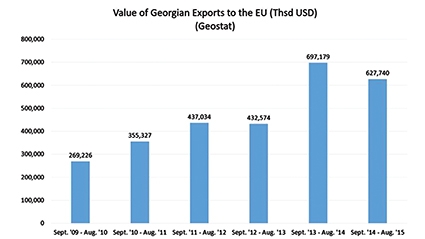Georgia’s Free Trade Pact with EU Makes Little Headway
TBILISI – A free trade agreement signed more than two years ago by the Georgian government and the European Union on a preferential free trade regime known as the Deep and Comprehensive Free Trade Area (DCFTA) was supposed to increase Georgia’s market access to the EU – the world’s largest trading bloc – but the actual positive impact of the agreement on trade between the two entities remains in question.
Known as the Deep and Comprehensive Free Trade Area (DCFTA), the agreement synchronized regulations and was supposed to increase trade between Georgia and the EU drastically. The results, however, have been mixed since the pact was signed on June 27, 2014, as the overall volume of trade between the two sides has substantially declined.
The total value of exports from Georgia to the EU plummeted by more than 10 per cent in US dollars between the end of 2014 and 2015, while the overall monetary value of imports only slightly increased by less than 2 per cent in the same period.
Georgia’s government said the decrease was due to the sharp devaluation of the national currency, the lari since the agreement was first signed. The government failed, however, to explain the 7 per cent drop in imports that were valued in lari or why such a precipitous decline could have occurred when the DCFTA removed all import and export tariffs between the EU and Georgia.
The number of Georgian exports heading to the EU during the same period has essentially flat-lined, with little evidence that even a modest increase will occur in the immediate future.
Georgia’s Tax Perception’s Survey showed that only 6 per cent of companies from an official research sample traded with the EU under the DCFTA agreement, with most Georgian Companies had expressed open hostility to fulfilling their current contracts under the DCFTA.
Under Georgia’s current legislation, all of the country’s registered companies must comply with DCFTA standards. The companies who have refused to export their products to the EU under the free agreement’s set standards are now pushing back against being forced to improve the quality of their products to meet Europe’s strict regulations on quality control.
Several experts in Georgia have expressed concern that the growing animosity of the private companied opposed to the agreement could have a serious negative impact on the local market and for Georgian consumers.
Critics of the Georgian Government’s implementation of the agreement say the current administration has taken a vague and misguided, "If we build it, they will come" approach to the DCFTA, but has failed to provide incentives to companies who remain skeptical of the DCFTA, and who prefer to trade with Russia, China and the Persian Gulf States.
By Natia Liparteliani
Edited by Nicholas Waller











